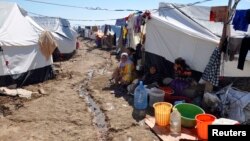International humanitarian officials said an immense humanitarian emergency is unfolding Iraq, where international assistance is urgently needed to help 5.2 million Iraqis, including 1.8 million displaced people, survive the coming winter.
It is already cold in Iraq and rainfall is frequent.
Humanitarian officials said the dire situation now facing millions of Iraqis will get even worse as winter approaches and weather conditions deteriorate further.
A joint mission by the Organization of Islamic Cooperation and the U.N. Office for the Coordination of Humanitarian Affairs visited Baghdad, Irbil, Dohuk and surrounding areas last week and viewed the situation along the Iraqi-Turkish border.
Displacement crisis
The mission said the situation is particularly dramatic in Kurdistan, which is bearing the brunt of the displacement crisis.
The Kurdistan region currently is hosting 850,000 of the 1.8 million people who have fled attacks from the Islamic State group. About half of the displaced are children.
Officials said hundreds of thousands of people are forced to live in sub-standard conditions. They live in unfinished buildings, on roads and bridges, in public buildings and schools.
Hesham Youssef, assistant secretary general of the Organization of Islamic Cooperation, said about 400 schools in Kurdistan are being used as temporary shelters for displaced people, so the start of the school year has been postponed until December.
Youssef told VOA that the humanitarian requirements are enormous.
“Winterization and shelter are priorities, particularly in the north because of those who are living in dire conditions," Youssef said.
"Medical care also is a priority because many camps do not have adequate medical facilities and schooling perhaps is the biggest problems for many. ... But, as far as displaced persons are concerned, there are zero schools," he said.
Last week, the United Nations appealed for $2.2 billion to meet the humanitarian needs of 5.2 million Iraqis through 2015. Saudi Arabia has contributed $500 million of the $600 million so far received.
The United Nations estimates the Islamic State group controls about one-third of Iraq. At least 3.6 million Iraqis are thought to live in these areas. Of these, the U.N. said 2.2 million are in urgent need of aid.
Aid agencies
Youssef said most of these people are unreachable by aid agencies. But, he said, the International Committee of the Red Cross is able to bring some aid into these areas and this is subsequently distributed by local community organizations.
He said the Iraqi government is concerned about the manner in which aid is reaching people in jihadist-controlled areas.
"This is the fear of the government in particular that humanitarian assistance may be overtaken by ISIS and distributed in a manner that would advance their political agenda," Youssef said, using another term for the Islamist militants. "That, and it seems that they have information that this has taken place in a number of cases. So, they are fearful of the continuation of this situation.”
The OCHA and OIC representatives said a number of Iraqi officials, including in Kurdistan, told them the security situation may deteriorate further as the war with Islamic State militants over control of the territory continues.
Unfortunately, they say everyone agrees the crisis in Iraq will not end soon.












